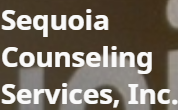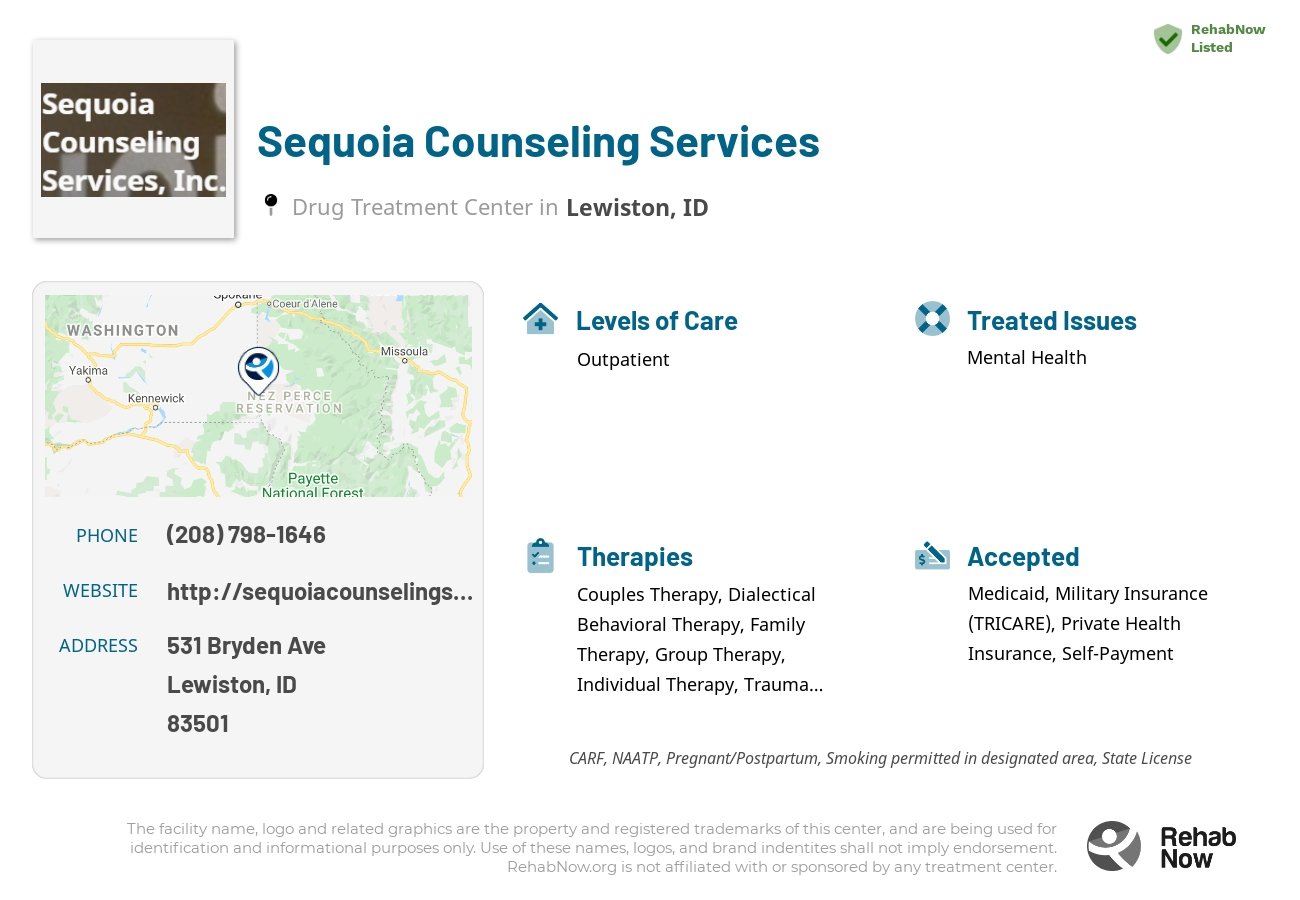Sequoia Counseling Services
Drug Rehab Center in Lewiston, Idaho
Sequoia Counseling Services provides addiction and co-occurring mental health disorder treatment through multidisciplinary professionals, individualized and evidence-based programs, and a range of therapies. They are accredited, licensed, and have received awards for their quality care.
About Sequoia Counseling Services in Idaho
Sequoia Counseling Services is an Addiction Treatment Facility located in Lewiston, Idaho. Founded in 2003, this facility specializes in treating individuals suffering from mental health issues and provides outpatient levels of care. With a mission to assist clients in achieving sustained recovery and overall well-being, Sequoia Counseling Services offers a range of professional services to cater to different needs.
At Sequoia Counseling Services, individuals struggling with addiction and substance abuse can access a variety of effective treatment methods. Along with their expertise in mental health, the facility offers counseling sessions that focus on substance abuse and addictive behaviors. These counseling sessions aim to help clients gain insight into the root causes of their addiction and provide them with strategies to overcome these challenges. Additionally, the center provides therapeutic support groups which offer individuals a safe space to share their experiences and receive guidance from peers who have been through similar circumstances. To further enhance the recovery process, Sequoia Counseling Services also incorporates evidence-based treatment approaches tailored to meet each client's specific needs.
Genders
Ages
Modality
Additional
Conditions and Issues Treated
Levels of Care Offered
This center offers a variety of custom treatment tailored to individual recovery. Currently available are Outpatient, with additional therapies available as listed below.
Outpatient treatment is often used for drug addicts in drug rehab. Outpatient treatment consists of counseling and therapy sessions. This form of treatment is also called ‘day-treatment’. The outpatient treatment process begins with the addict’s initial detox period, lasting about ten days.
Outpatient treatment is used for those who are at moderate risk for ‘slipping back’ into the addiction, for those who:
- Are not currently experiencing any side effects from withdrawal and can handle social pressure
- Can handle stressors that might trigger relapse
- Have a stable living environment or have moved out of their previous environment, which was not conducive to being sober
- Have a support system that allows them to go to a facility a few times a week while still keeping their current responsibilities
- Have no legal obligations, being either on parole or probation, that require them to seek treatment at a mandatory facility
- Are not currently experiencing any side effects from withdrawal and can handle social pressure
- Have a stable living environment or have moved out of their previous environment, which was not conducive to being sober
Therapies & Programs
Because no single treatment is effective for all addicts, the goal of treatment and therapy should be to figure out what works best for each individual. Tolerance and withdrawal levels differ from person to person, affecting the treatment intensity required. Addiction treatment should aim to help addicts develop healthy coping mechanisms for dealing with their addiction and its underlying causes.
Couples therapy works with clients and significant others in a professional capacity to improve relationship dynamics. This can be helpful for addicts who are trying to marry the idea of recovery into their work, family, social lives – any aspect that has to do with relationships. Through counseling sessions, addicts will have an opportunity to talk about their addiction with professional partners.
Family therapy is beneficial for people who are in addiction treatment services because it offers addicts the opportunity to work with their family members to better understand what led them to make choices that contributed to their addiction.
This type of therapy helps family members reach a deeper understanding of how they can best support their loved one during recovery. It also helps the addict better understand their own motivations and triggers that led them to turn to substance abuse.
Family therapy can help addicts in the following ways:
- Assists family members in processing difficult feelings so they don’t blame or resent recovering addicts
- Assists family members in understanding how addiction has impacted the addict and everyone who is involved with them
- Allows the addict to take responsibility for their actions, while encouraging improved communication skills
- Helps family members understand how to best support an individual in recovery so addicts don’t relapse again.
Group therapy can help build a stronger support system and give addicts in Lewiston, ID insight into their addiction that they gain through shared conversations. Group therapy occurs in a controlled group environment, exclusive of one on one meetings. This makes it safer for patients to feel comfortable sharing the struggles they’re going through and gaining perspective.
Trauma therapy is beneficial for people who are recovering from drug addiction because it helps them heal from past traumas that may have caused them to turn to harmful substances or led them to experience negative emotions that contributed to their destructive behaviors.
This type of treatment works by processing difficult experiences so individuals can learn how to process these events without having to turn to substances for coping.
Trauma therapy can help addicts in the following ways:
- Helps individuals understand their experiences and emotional responses to difficult events, including why they turned to drugs or alcohol
- Provides them with comfort and support while working through difficult emotions related to these traumatic experiences
- Offers an opportunity for addicts to have a voice and be heard, which can improve their self-esteem
- Can help them develop coping skills so they can better respond to triggers instead of turning to substance abuse.
Dialectical Behavior Therapy (DBT) is a cognitive-behavioral therapy that helps patients understand the relationship between their thoughts, feelings, and behaviors. It is beneficial for those whose addictions and behaviors stem from severe mental health issues. The term “Dialectic” means the integration of opposites. In substance abuse, DBT refers to accepting the patient’s addiction and working to change their thoughts and behavior. It improves life skills such as controlling intense emotions without reacting impulsively, resolving interpersonal conflicts effectively, and promoting awareness about self and others.
Cognitive-behavioral therapy is a technique that is used to help people with addiction. Specifically, it is a way of identifying thoughts and behaviors that cause the addiction. It is typically used in an individual counseling session.
The content explains cognitive behavioral therapy and how it works to address some behaviors that may be leading to unintended consequences in their life, as well as its benefits for those seeking sobriety.
It works by helping people to talk through their issues and addressing the thoughts that cause said behaviors. It is an excellent way of learning about oneself and one’s perception of the world.
Payment Options Accepted
For specific insurance or payment methods please contact us.
Is your insurance accepted?
Ask an expert, call (888) 674-0062
Additional Details
Specifics, location, and helpful extra information.
Lewiston, Idaho 83501 Phone Number(208) 798-1646 Meta DetailsUpdated November 25, 2023
Staff Verified
Sequoia Counseling Services Patient Reviews
There are no reviews yet. Be the first one to write one.
Lewiston, Idaho Addiction Information
In 2010, Idaho ranked amongst the top ten states of substance abuse in several categories. Alcohol dependence and abuse pose a major problem throughout the state, especially among minors between the ages of 12 and 17 years old. Opioids, like everywhere else in the nation, are also responsible for many substance abuse problems in the Gem State.
The drug addiction issue in Lewiston, Idaho, is modest. According to the National Institute on Drug Abuse, about 7.9% of people in Lewiston abuse drugs. From 2011 to 2015, the rate of overdose deaths increased by 68%, making prescription opioids one of the most commonly involved drugs in overdose. It is important to find a treatment program that fits the individual's needs and preferences.
Treatment in Nearby Cities
- Burley, ID (309.5 mi.)
- Rathdrum, ID (99.1 mi.)
- Grangeville, ID (52.6 mi.)
- Fruitland, ID (164.2 mi.)
- Boise, ID (195.3 mi.)
Centers near Sequoia Counseling Services
The facility name, logo and brand are the property and registered trademarks of Sequoia Counseling Services, and are being used for identification and informational purposes only. Use of these names, logos and brands shall not imply endorsement. RehabNow.org is not affiliated with or sponsored by Sequoia Counseling Services.


